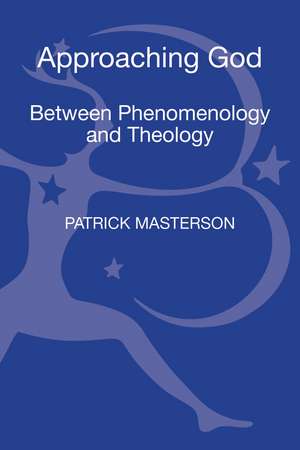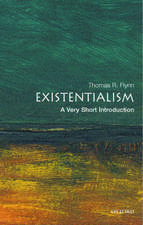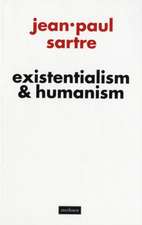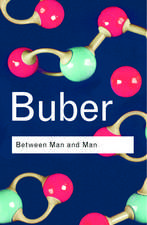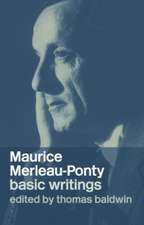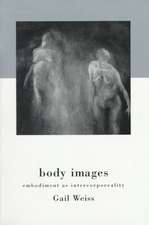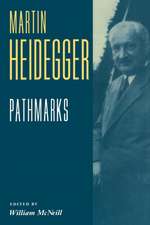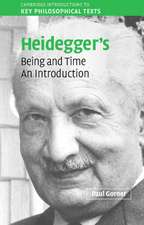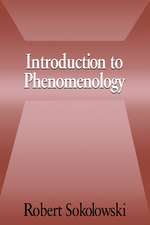Approaching God: Between Phenomenology and Theology
Autor Professor Patrick Mastersonen Limba Engleză Hardback – 9 oct 2013
| Toate formatele și edițiile | Preț | Express |
|---|---|---|
| Paperback (1) | 300.09 lei 6-8 săpt. | |
| Bloomsbury Publishing – 9 oct 2013 | 300.09 lei 6-8 săpt. | |
| Hardback (1) | 828.53 lei 6-8 săpt. | |
| Bloomsbury Publishing – 9 oct 2013 | 828.53 lei 6-8 săpt. |
Preț: 828.53 lei
Preț vechi: 1064.96 lei
-22% Nou
Puncte Express: 1243
Preț estimativ în valută:
158.61€ • 165.11$ • 130.58£
158.61€ • 165.11$ • 130.58£
Carte tipărită la comandă
Livrare economică 01-15 februarie 25
Preluare comenzi: 021 569.72.76
Specificații
ISBN-13: 9781623563721
ISBN-10: 1623563720
Pagini: 224
Dimensiuni: 140 x 216 x 10 mm
Greutate: 0.39 kg
Ediția:New.
Editura: Bloomsbury Publishing
Colecția Bloomsbury Academic
Locul publicării:New York, United States
ISBN-10: 1623563720
Pagini: 224
Dimensiuni: 140 x 216 x 10 mm
Greutate: 0.39 kg
Ediția:New.
Editura: Bloomsbury Publishing
Colecția Bloomsbury Academic
Locul publicării:New York, United States
Caracteristici
Explores the inter-relationships between phenomenology, metaphysics and theology
Notă biografică
Patrick Masterson is Emeritus Professor of Philosophy of Religion at University College Dublin, Ireland. His publications include Atheism and Alienation: A Study of the Philosophical Sources of Contemporary Atheism (Penguin, 1973), The Sense of Creation (Ashgate, 2008), and, with Seamus Heaney, Articulations: poetry, philosophy, and the shaping of culture (2008). Professor Masterson has had the honor of serving as President of University College Dublin (1986-93), Vice-Chancellor of the National University of Ireland (1987 & 1988) and as President of the European University Institute, Florence (1994-2002). He has been the recipient of a number of international awards and honors, including honorary doctorates from the University of Caen, Trinity College Dublin, and New York University.
Cuprins
INTRODUCTION 1. PHENOMENOLOGY 2. METAPHYSICS 3. THEOLOGY 4. SPIRIT 5. COMPARISONS 6. RELATIONS 7. CONCLUSION BIBLIOGRAPHY ENDNOTES
Recenzii
The title of this volume by Masterson (emer., University College Dublin) is appropriately ambiguous. Is it God that one is approaching in philosophy and theology? Or merely discourses about 'God'? According to Masterson, this ambiguity is necessary. To speak of God is always to speak about pre-philosophical experiences. And yet to speak of such experiences is to use the available philosophical (and/or theological) categories. Thus masterson's book might be viewed primarily as a practice of metaphilosophy insofar as it attempts to think about the primary ways in which 'God-talk' occurs and the entailments regarding people's models of God that such varying talk would yield. Suggesting that these primary ways are appropriately labeled 'phenomenological,' 'metaphysical,' and theological,' Masterson offers sustained engagements with the representative figures for each approach: Jean-Luc Marion, Thomas Aquinas, and Karl Barth, respectively. The differences between these approaches are a matter of which first principles are in play in each: consciousness, being, and God. Ultimately, thought most of this volume is devoted to working through the differences between these approaches, the eventual, complementary account of how they must work together, given human limitations, is quite compelling. Summing Up: Recommended. Upper-level undergraduates through researchers/faculty.
[Masterson's] thesis is compelling and rightly challenges the excessive dismissiveness that can sometimes occur within continental philosophy of religion...Masterson's clear and lucid meta-philosophical work does encourage such conversations and I applaud his willingness to interrogate assumptions about differences that have often problematically shut down dialogue rather than served as sites of constructive engagement.
[Masterson's] latest book takes an ambitious step further. Masterson wants to mediate between the three powerful and competing contemporary approaches to the divine - the phenomenological, metaphysical and theological - seeking to find a way to continue talking about God in our bleak, post-confessional landscapes...Masterson's careful and challenging engagement with Jean-Luc Marion is a particular highlight of the book. Overall, Masterson offers an important corrective to postmodern philosophy and theology. He strongly defends the values and insights of the Thomist tradition but also welcomes phenomenological explorations of the human experience of the divine.
Patrick Masterson's new book is a welcome contribution to the debate concerning the meta-phenomenological and meta-theological question of the mode of approach to and from God. [...] For Masterson there are no tidy answers to the question of the relation of phenomenology, metaphysics and theology. The intersection of these three approaches needs to be continuously negotiated. Masterson sees himself as setting out a "roadmap" for a "complex landscape" (159), and he has certainly done this.
In this concise and thoughtful book, Patrick Masterson discusses two approaches to the philosophical understanding of God; the phenomenological exemplified by Jean-Luc Marion, and the metaphysical, represented by Thomas Aquinas [.] His book provides valuable material for examining how these two forms of philosophy relate to one another, and how they can each serve in the philosophy of religion and in theology. [.] Masterson's explicit and detailed contrast between phenomenology and Thomistic metaphysics is an important contribution to current philosophy of religion and theology, but it has a wider scope than that; it helps us to understand the difference between modern and premodern philosophy in general. [.] Patrick Masterson has taken on a difficult task in this book. [.] [He] has put into play two prominent approaches to theology, phenomenology, and Thomistic metaphysics, and has shown how each can benefit the other. He has done so with clarity and conviction. To paraphrase Paul Ricoeur, 'Ce livre donne á penser.'
Masterton's works are few but precious ... [With Approaching God] he has produced a culminating chef d'oeuvre [which] carries forward the same traits that no one else practices to the same degree: first of all, a meticulous and exhaustive scholarship ... Secondly, a concern to do total justice to a new position such that he works himself inside it and describes it ... with such penetrating concision, a lyrical exactness and beauty, that is so superior to what its own strenuous advocates have achieved ... All his books are classics, and we should all practice philosophy as irenically, integrally, and modestly as Masterton.
Should we approach God through reason and philosophy-or should we let God approach us through divine Revelation? Approaching God is a elegant account of how we can do both, and it is full of wise and discerning counsel about how to manage such a delicate operation. Starting from a robust defense of Thomistic metaphysics in the face of postmodern critics of onto-theology, Patrick Masterson brings Aquinas into living dialogue with contemporary philosophy, providing in particular an original and extended confrontation of Aquinas's notion of God as subsistent being with Jean-Luc Marion's God without being. Genteel but magisterial, lucid but deep, generous but critical, this book represents an insightful tour by an erudite and skillful guide of the most daunting questions in philosophy and theology today.
The major strength of Approaching God is its critical dialogue between Thomistic realism and Marion's phenomenology, and it is intrinsically interesting on that score, since these two lines of philosophy very rarely meet. I cannot think of another work trying to engender such a meeting. This fine work does this with impressive thoughtfulness and fidelity to the richness of the partners in dialogue.
Approaching God contributes a new and compelling voice to the current debate on the return of religion, bringing together three different discourses, the phenomenology of Marion, the ontology of Aquinas and the theology of Barth. It is a brilliant triangulation of these three voices.
The phenomenology of Marion, the metaphysics of Thomas Aquinas, the fideism of Barth: often enough any two of them are brought into positive conversation with one another, but rarely, as in Masterson's new book, all three together, and even less commonly with so constructive and nuanced an outcome. A remarkable achievement.
[Masterson's] thesis is compelling and rightly challenges the excessive dismissiveness that can sometimes occur within continental philosophy of religion...Masterson's clear and lucid meta-philosophical work does encourage such conversations and I applaud his willingness to interrogate assumptions about differences that have often problematically shut down dialogue rather than served as sites of constructive engagement.
[Masterson's] latest book takes an ambitious step further. Masterson wants to mediate between the three powerful and competing contemporary approaches to the divine - the phenomenological, metaphysical and theological - seeking to find a way to continue talking about God in our bleak, post-confessional landscapes...Masterson's careful and challenging engagement with Jean-Luc Marion is a particular highlight of the book. Overall, Masterson offers an important corrective to postmodern philosophy and theology. He strongly defends the values and insights of the Thomist tradition but also welcomes phenomenological explorations of the human experience of the divine.
Patrick Masterson's new book is a welcome contribution to the debate concerning the meta-phenomenological and meta-theological question of the mode of approach to and from God. [...] For Masterson there are no tidy answers to the question of the relation of phenomenology, metaphysics and theology. The intersection of these three approaches needs to be continuously negotiated. Masterson sees himself as setting out a "roadmap" for a "complex landscape" (159), and he has certainly done this.
In this concise and thoughtful book, Patrick Masterson discusses two approaches to the philosophical understanding of God; the phenomenological exemplified by Jean-Luc Marion, and the metaphysical, represented by Thomas Aquinas [.] His book provides valuable material for examining how these two forms of philosophy relate to one another, and how they can each serve in the philosophy of religion and in theology. [.] Masterson's explicit and detailed contrast between phenomenology and Thomistic metaphysics is an important contribution to current philosophy of religion and theology, but it has a wider scope than that; it helps us to understand the difference between modern and premodern philosophy in general. [.] Patrick Masterson has taken on a difficult task in this book. [.] [He] has put into play two prominent approaches to theology, phenomenology, and Thomistic metaphysics, and has shown how each can benefit the other. He has done so with clarity and conviction. To paraphrase Paul Ricoeur, 'Ce livre donne á penser.'
Masterton's works are few but precious ... [With Approaching God] he has produced a culminating chef d'oeuvre [which] carries forward the same traits that no one else practices to the same degree: first of all, a meticulous and exhaustive scholarship ... Secondly, a concern to do total justice to a new position such that he works himself inside it and describes it ... with such penetrating concision, a lyrical exactness and beauty, that is so superior to what its own strenuous advocates have achieved ... All his books are classics, and we should all practice philosophy as irenically, integrally, and modestly as Masterton.
Should we approach God through reason and philosophy-or should we let God approach us through divine Revelation? Approaching God is a elegant account of how we can do both, and it is full of wise and discerning counsel about how to manage such a delicate operation. Starting from a robust defense of Thomistic metaphysics in the face of postmodern critics of onto-theology, Patrick Masterson brings Aquinas into living dialogue with contemporary philosophy, providing in particular an original and extended confrontation of Aquinas's notion of God as subsistent being with Jean-Luc Marion's God without being. Genteel but magisterial, lucid but deep, generous but critical, this book represents an insightful tour by an erudite and skillful guide of the most daunting questions in philosophy and theology today.
The major strength of Approaching God is its critical dialogue between Thomistic realism and Marion's phenomenology, and it is intrinsically interesting on that score, since these two lines of philosophy very rarely meet. I cannot think of another work trying to engender such a meeting. This fine work does this with impressive thoughtfulness and fidelity to the richness of the partners in dialogue.
Approaching God contributes a new and compelling voice to the current debate on the return of religion, bringing together three different discourses, the phenomenology of Marion, the ontology of Aquinas and the theology of Barth. It is a brilliant triangulation of these three voices.
The phenomenology of Marion, the metaphysics of Thomas Aquinas, the fideism of Barth: often enough any two of them are brought into positive conversation with one another, but rarely, as in Masterson's new book, all three together, and even less commonly with so constructive and nuanced an outcome. A remarkable achievement.
